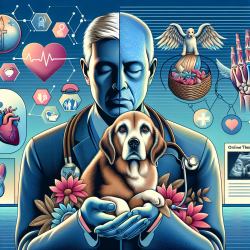Introduction
The COVID-19 pandemic has undeniably reshaped the landscape of healthcare, particularly in emergency departments (EDs) across the United States. As we navigate the post-pandemic world, the insights gleaned from the research article "The Impact of Coronavirus Disease 2019 on US Emergency Departments" by Alvarez Romero et al. offer valuable lessons for practitioners aiming to enhance their skills and adapt to the evolving challenges in emergency care.
Understanding the Impact
The pandemic led to a paradoxical situation where behavioral emergencies surged, yet overall visits to EDs decreased. This decline was primarily due to the public's fear of contracting the virus in healthcare settings. As a result, many individuals delayed seeking care, exacerbating preexisting mental health conditions and leading to an increase in new behavioral health diagnoses.
For practitioners, this highlights the critical need to address mental health issues proactively and ensure that patients feel safe and supported when seeking emergency care. By understanding the factors that contributed to the decrease in ED visits, healthcare providers can develop strategies to reassure patients and encourage timely medical attention.
Innovative Solutions for the Future
The pandemic has accelerated the adoption of innovative approaches to managing behavioral emergencies in EDs. One such innovation is the increased use of telepsychiatry, which allows for timely psychiatric consultations via videoconferencing. This approach not only reduces the need for inpatient hospitalization but also enhances patient care by providing immediate access to mental health professionals.
Additionally, the establishment of EmPATH units (Emergency Psychiatry Assessment, Treatment, and Healing units) has proven effective in alleviating emergency psychiatric conditions. These units offer a calming environment with prompt access to psychiatric care, significantly reducing the need for prolonged ED stays and preserving inpatient resources for those in critical need.
Encouraging Further Research
While the pandemic has prompted significant advancements in emergency care, ongoing research is essential to refine these innovations and develop new strategies. Practitioners are encouraged to delve deeper into the outcomes of the research presented by Alvarez Romero et al. and explore additional studies that focus on improving ED management of behavioral emergencies.
By staying informed and actively participating in research, healthcare providers can continue to enhance their skills and contribute to the evolution of emergency care in a post-pandemic world.
Conclusion
The COVID-19 pandemic has highlighted the importance of adaptability and innovation in healthcare. As we move forward, practitioners must embrace change and leverage the insights gained from recent research to improve emergency care for all patients, particularly those with behavioral health needs.
To read the original research paper, please follow this link: The Impact of Coronavirus Disease 2019 on US Emergency Departments.










